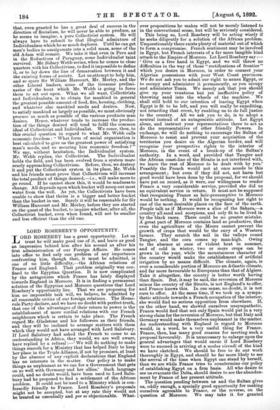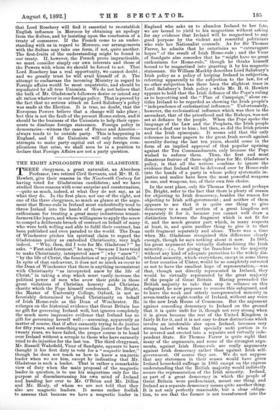LORD ROSEBERY'S OPPORTUNITY. L ORD ROSEBERY has a great opportunity. Let
us trust he will make good use of it, and leave as good an impression behind him after his second as after his first administration of our Foreign Affairs. He comes into office to find only one problem of any importance confronting him, though that, it must be admitted, is one of no little difficulty,—the African relations of France and England. That problem originally was con- fined to the Egyptian Question. It is now complicated by the antagonism which France has lately displayed towards England in Morocco. It is in finding a permanent solution of the Egyptian and Morocco questions that Lord Rosebery's opportunity lies. That we are proposing for him no impossible task will, we believe, be admitted by all reasonable critics of our foreign relations. The Home- rule Party declare, and we have no doubt with perfect truth, that one of the advantages of their return to power is the establishment of more cordial relations with our French neighbours which is certain to take place. The French regard Mr. Gladstone and his followers as their friends, and they will be inclined to arrange matters with them which they would not have arranged with Lord Salisbury. If Lord Salisbury had asked the French to come to an understanding in Africa, they would, we are well aware, have replied by a refusal :—‘ We will do nothing to make things smooth for a Ministry that has helped Italy to keep her place in the Triple Alliance, if not by promises, at least by the absence of any explicit declarations that England has no interests in the matter. Our policy is to make things as unpleasant as we can for a Government that gets on so well with Germany and her allies.' Such language could, and no doubt would, have been used to Lord Salis- bury had he proposed to find a settlement of the African problem. It could not be'used to a Ministry which is con- fessedly friendly to France. Lord Rosebery's proposals might not be accepted, but at any rate they would not be treated as essentially and per se objectionable. What- ever propositions he makes will not be merely listened to in the conventional sense, but will be seriously considered. This being so, Lord Rosebery will be acting wisely if he seeks diligently for a solution of the African problem. Unquestionably there exists plenty of material out of which to form a compromise. French sentiment may be involved in Egypt, but French interests of a far more tangible kind attach to the Empire of Morocco. Let Lord Rosebery say :- 'Give Give us a free hand in Egypt, and we will throw no difficulties in the way of those "rectifications of frontier" which you desire in Morocco, in order to connect your Algerian possessions with your West Coast provinces. We do not ask you to admit our right to annex Egypt, or to occupy and administer it permanently, as you occupy and administer Tunis. We merely ask that you should give up your vexatious but yet ineffective policy of throwing sand into the wheels of the machine. We shall still hold to our intention of leaving Egypt when Egypt is fit to be left, and you will really be expediting, not retarding that event, by enabling 11B to do full justice to the country. All we ask you to do, is to adopt a neutral instead of an antagonistic attitude. Let Egypt alone, and instruct your representatives there to act as do the representatives of other friendly Powers. In exchange, we will do nothing to encourage the Sultan of Morocco to resist and prevent your acquisition of the territories you desire on the Algerian border, and will recognise your prospective rights to the interior of Morocco, in the event of a break-up of the Sultan's authority. In a word, and provided that Tangier and. the African coast-line of the Straits is not interfered with, we leave the rest of Morocco to be dealt with by you.' Possibly the French would not at once accede to this arrangement ; but even if they did not, not harm but good would have been done by the proposal, for we should have put on record, as it were, our willingness to render France a very considerable service, provided she did us an equivalent service in return. It must not be supposed that recognising France as heir-presumptive to Morocco would be nothing. It would be recognising her right to one of the most desirable places on the face of the earth. People talk as if Morocco were a slice of the Sahara,—a country all sand and scorpions, and only fit to be lived in by the black races. There could be no greater mistake. A great part of Morocco contains land so productive, that even the agriculture of the Moors cannot prevent the growth of crops that would be the envy of a Western farmer. They scratch the soil in the valleys round Tangier, and the corn comes up man-high. Owing to the absence at once of violent heat in summer, and of cold in winter, two or more crops can be grown in the year, while the mountainous character of the country would make the establishment of artificial irrigation by no means difficult. The climate, again, is over a considerable portion of Morocco an Atlantic climate, and far more favourable to Europeans than that of Algiers. Take it altogether, the country is better worth having than Spain. But, it may be said, the reversion of Morocco minus the country of the Straits, is not England's to offer, and France knows this. In one sense, no doubt, it is not ours to offer. At the same time, if we took up a sympa- thetic attitude towards a French occupation of the interior, she would find no serious opposition from elsewhere. If, on the other hand, we showed ourselves unsympathetic, France would find that not only Spain would put in a very strong claim for the reversion of Morocco, but that Italy and Germany would make themselves unpleasant in the matter. An understanding with England in regard to Morocco would, in a word, be a very useful thing for France. France, then, has many good. reasons for meeting such a proposal favourably. It is unnecessary to enlarge upon the general advantages that would ensue if Lord Rosebery were to succeed in arriving at a modus vivendi of the kind we have sketched. We should be free to do our work thoroughly in Egypt, and should be far more likely to see the arrival of the time when Egypt can stand by herself, than we are while France tries to countermine our policy of establishing Egypt on a firm basis. All who desire to see us evacuate the Delta, should desire to see the abandon- ment by France of her present attitude. The question pending between us and the Sultan gives us, oddly enough, a specially good. opportunity for making ourselves agreeable to France, or the reverse, on the question of Morocco. We may take it for granted that Lord Rosebery will find it essential to re-establish English influence in Morocco by obtaining an apology from the Sultan, and. by insisting upon the conclusion of a treaty of commerce. If the French come to an under- standing with us in regard to Morocco, our arrangements with the Sultan may take one form, if not, quite another. The first-fruits of the understanding might be found in our treaty. If, however, the French prove impracticable, we must consider simply our own interests and those of the Powers with whom we should be forced to act. That Lord Rosebery has a real opportunity, we cannot doubt ; and we greatly trust he will avail himself of it. The attempt to embarrass the incoming Ministry in regard to Foreign affairs would be most unpatriotic, and should be repudiated by all true Unionists. We do not believe that the bulk of Mr. Gladstone's followers desire or intend any tilt ration whatever in our foreign policy. That is proved by the fact that no serious attack on Lord Salisbury's policy was made at the Election. It is true, no doubt, that the European Powers believe that a change will take place ; but this is not the fault of the present Home-rulers, and it should be the business of the Unionists to help their oppo- nents to disabuse foreign statesmen. Foreign policy in democracies—witness the cases of France and America— always tends to be outside party. This is happening in England, and if the Unionists will only refrain from attempts to make party capital out of any foreign com- plications that arise, we shall soon be in a position to declare that Foreign Affairs are not a party question.



































 Previous page
Previous page